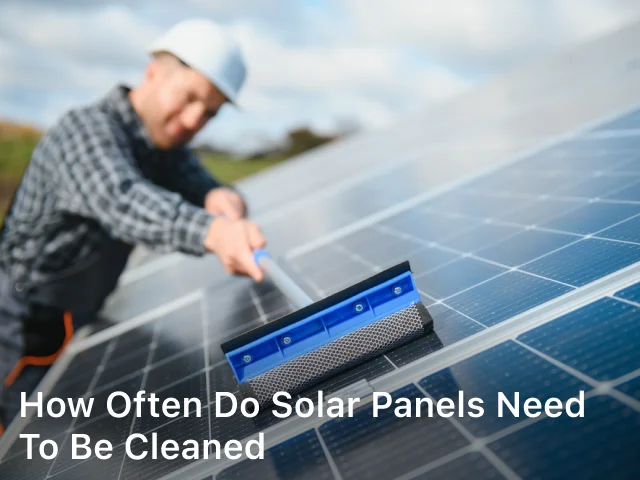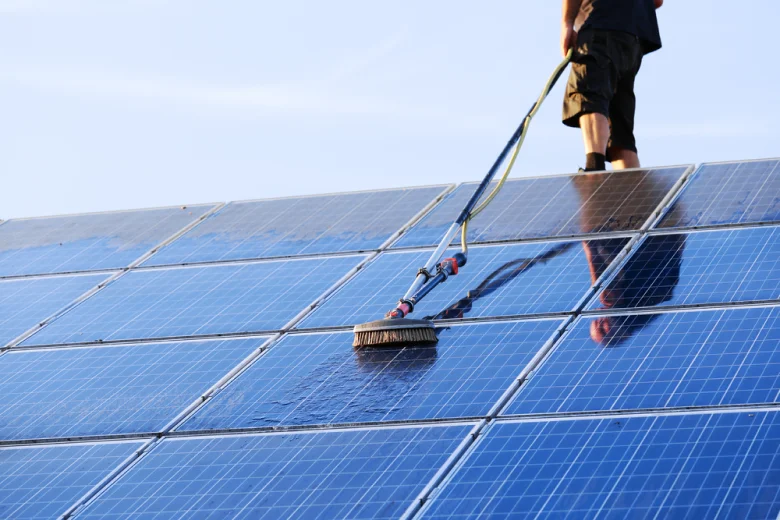
How Often do Solar Panels Need to be Cleaned – Discover the Surprising Truth: Learn How Often You Should Clean Your Solar Panels for Maximum Efficiency and Savings!
Solar panels have become an increasingly popular choice for clean and renewable energy generation. They harness the power of the sun to produce electricity, which not only reduces your carbon footprint but also saves you money on your energy bills.
However, like any other investment, solar panels require maintenance to ensure they operate at peak efficiency. One common question that solar panel owners often ask is, “How often do solar panels need to be cleaned?”
How Often do Solar Panels Need to be Cleaned
In this comprehensive guide, we will explore the factors that determine the cleaning frequency, common misconceptions, and provide you with a clear understanding of how to maintain your solar panels for optimal performance.

The Importance of Clean Solar Panels
Before delving into how often solar panels need to be cleaned, it’s crucial to understand why keeping them clean is essential.
1. Efficiency and Energy Output
Clean solar panels are more efficient at converting sunlight into electricity. When dirt, dust, bird droppings, or other debris accumulate on the surface of your panels, it acts as a barrier that reduces the amount of sunlight they can absorb. This means that dirty solar panels produce less electricity than clean ones, resulting in a decrease in energy production and financial savings.
2. Longevity of Your Investment
Solar panels are a significant financial investment, and you want to maximize their lifespan. Regular cleaning can help prevent long-term damage to your panels. Accumulated dirt and grime can corrode the surface and lead to deterioration over time. Cleaning your panels ensures they remain in good condition for years to come.
Factors Affecting Cleaning Frequency
The frequency at which you should clean your solar panels depends on various factors. Let’s explore these factors in detail:
1. Location
The location of your solar panels plays a significant role in determining how often they need cleaning. Panels in areas with high levels of pollution, dust, or bird activity will require more frequent cleaning than those in cleaner, less polluted areas.
2. Weather Conditions
Weather conditions also affect the cleaning frequency. Rain can naturally wash away some dirt, reducing the need for cleaning. However, areas with infrequent rainfall may require more attention. Additionally, snow can block sunlight during the winter months, and removing it promptly is essential for maintaining efficiency.
3. Tilt Angle
The tilt angle of your solar panels can impact how often they need cleaning. Panels with a steeper tilt angle may accumulate less debris due to the natural shedding effect. Flat panels tend to collect more dust and dirt.
4. Type of Contaminants
The type of contaminants on your solar panels matters. Bird droppings, tree sap, and pollen can be particularly problematic and may require more immediate cleaning, as they can have a more significant impact on efficiency.
Cleaning Methods and Best Practices
Now that you understand the importance of clean solar panels and the factors affecting cleaning frequency, let’s explore the best methods and practices for cleaning your solar panels:
1. Manual Cleaning
Manual cleaning involves using water, a soft brush or sponge, and mild soap to gently scrub the surface of the panels. This method is suitable for removing dirt, dust, and most types of contaminants. However, be cautious not to scratch the panel’s surface, and avoid using abrasive materials.
2. Automated Cleaning Systems
Automated cleaning systems, such as robotic cleaners or water-fed brushes, can be a convenient option for larger solar panel installations. These systems are designed to safely and efficiently clean solar panels without the need for manual intervention.
3. Professional Cleaning Services
If you’re unsure about how to clean your solar panels properly or have a complex setup, consider hiring a professional cleaning service. They have the experience and equipment needed to clean your panels effectively and safely.
How do I know if my solar panels need to be cleaned?
Knowing when your solar panels need cleaning is essential to ensure they operate at their optimal efficiency. Here are some signs to help you determine if your solar panels require cleaning:
- Visible Dirt and Debris: A straightforward way to check if your solar panels need cleaning is to visually inspect them. Look for a layer of dirt, dust, leaves, bird droppings, or other debris covering the panel’s surface. If you notice a significant buildup, it’s time to clean them.
- Reduced Energy Output: Monitor your solar panel system’s energy production regularly. If you notice a sudden drop in energy generation over an extended period, it may be an indication that dirt and grime are affecting their efficiency. Keep a record of your system’s performance to track any significant declines.
- Streaks or Water Marks: After a rainy day or cleaning attempt, check the panels for streaks or water marks. These can indicate that the water used for cleaning dried before it could be wiped away, leaving residues on the surface. If you see streaks, it may be time for a more thorough cleaning.
- Bird Droppings and Tree Sap: Bird droppings and tree sap are known to reduce the efficiency of solar panels quickly. If you notice these substances on your panels, clean them promptly, as they can harden and become more challenging to remove over time.
- Visible Shadows: Shadows cast on your solar panels, such as those from nearby trees or structures, can reduce energy production. If your panels are shadowed for an extended period during the day, they may not need cleaning, but rather a strategic adjustment of their placement or trimming of nearby foliage.
- Seasonal Changes: Consider the time of year and local weather conditions. For instance, if you live in an area with a dry and dusty season, you may need to clean your panels more frequently during that time. Conversely, in the winter, snow accumulation can block sunlight, so clearing the snow is essential.
- Regular Maintenance Schedule: Establishing a routine maintenance schedule, such as cleaning your solar panels every 6 to 12 months, can help ensure that you don’t forget to clean them regularly. Set reminders to coincide with favorable weather conditions.
- Monitoring Systems: Some advanced solar panel systems come equipped with monitoring systems that provide real-time data on energy production. These systems can alert you if there is a significant drop in performance, indicating that cleaning may be needed.
In summary, keeping an eye on visible dirt and debris, monitoring your energy production, and being aware of specific environmental factors can help you determine when your solar panels need cleaning. Regular inspections and proactive maintenance can ensure that your solar panel system continues to generate clean and efficient electricity.
Keep Reading : How Much Does Solar Panel Cleaning Cost in 2023
Do solar panels need routine maintenance?
Yes, solar panels do require routine maintenance to ensure they operate efficiently and continue to generate clean energy. While solar panels are relatively low-maintenance compared to many other home systems, regular upkeep can extend their lifespan and maximize their performance.
Here are some key aspects of routine solar panel maintenance:
- Visual Inspections: Conduct regular visual inspections of your solar panels. Look for signs of dirt, debris, bird droppings, or shading caused by trees or other obstructions. Visual inspections can help you identify issues that may require cleaning or adjustments.
- Cleaning: Solar panels can accumulate dust, dirt, leaves, bird droppings, and other debris over time, which can reduce their efficiency. Cleaning the panels as needed, typically every 6 to 12 months, is essential to remove these contaminants. Manual cleaning with a soft brush or sponge and mild soap is usually sufficient. Avoid using abrasive materials or high-pressure water, as they can damage the panel’s surface.
- Monitoring Performance: Keep track of your solar panel system’s performance. Many systems come with monitoring tools that allow you to check energy production levels regularly. A significant drop in energy output could indicate a problem that requires attention.
- Trimming Nearby Trees: If trees or vegetation are casting shadows on your solar panels, it’s a good idea to trim them to prevent shading. Shading reduces energy production, and by addressing this issue, you can improve your system’s efficiency.
- Checking for Loose Connections: Ensure that all electrical connections are secure. Loose or corroded connections can lead to power loss or even damage to your solar panel system. Consult a professional if you suspect any electrical issues.
- Inspecting for Damage: Occasionally inspect your solar panels for physical damage, such as cracks, chips, or scratches. While solar panels are durable, damage can occur, and it’s important to address it promptly to prevent further deterioration.
- Clearing Snow and Debris: In regions with heavy snowfall or frequent dust storms, clearing snow and debris from the panels is crucial. Snow can block sunlight, and accumulated debris can reduce energy production.
- Professional Maintenance: Consider scheduling periodic professional inspections and maintenance. Experienced technicians can conduct thorough assessments, identify potential problems, and perform necessary repairs or cleaning.
- Checking Inverters: If your solar panel system includes inverters, ensure they are functioning correctly. Inverters are critical components that convert DC electricity generated by the panels into AC electricity for use in your home.
- Reviewing Warranty Information: Familiarize yourself with the warranty terms of your solar panel system. Some warranties may require regular maintenance to remain valid.
FAQs
Q1: How often do solar panels need to be cleaned?
The cleaning frequency varies based on factors like location, weather, and panel tilt. On average, panels should be cleaned every 6 to 12 months. However, more frequent cleaning may be necessary in areas with high pollution or frequent dust storms.
Q2: Can I use a pressure washer to clean my solar panels?
It’s not recommended to use a pressure washer, as the high pressure can damage the panels. Stick to manual cleaning with a soft brush or sponge and mild soap or seek professional services.
Q3: Do I need to turn off my solar panels before cleaning?
No, you don’t need to turn off your solar panels while cleaning them. They can be cleaned safely while they are operational.
Q4: What time of day is best for cleaning solar panels?
Cleaning your panels in the morning or evening when the sun is less intense is ideal. Avoid cleaning them during peak sunlight hours to prevent rapid drying of water and soap, which can leave streaks.
Q5: Can I clean my solar panels in the winter?
Yes, it’s important to clean your panels in the winter, especially if they are covered with snow. Snow blocks sunlight and reduces energy production, so clearing it promptly is essential.
Conclusion
Maintaining clean solar panels is crucial for maximizing energy production and protecting your investment. While the cleaning frequency varies depending on several factors, regular inspection and cleaning every 6 to 12 months is a good starting point.
By following the best practices outlined in this guide, you can ensure that your solar panels continue to generate clean and efficient electricity for years to come, contributing to a sustainable and eco-friendly future.




